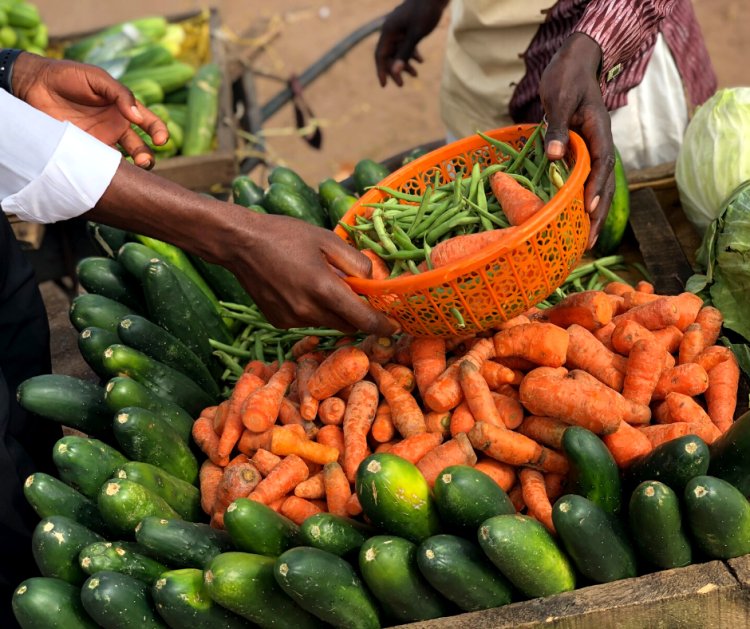This article is part of a series of special thought pieces that APRI published in partnership with the African Climate Foundation in the run up to COP27 in Egypt. The series is titled “What does the Just Transition mean for Africa”.
Summary
- The Russia-Ukraine war and the COVID-19 pandemic have exacerbated the impacts of the climate emergency on African food systems. It has highlighted the urgent need for intervention in food systems and the functioning of food markets across Africa.
- Territorial markets have the potential to improve food systems' resilience to external shocks and improve food and nutrition security but African governments are not giving it enough policy attention.
- Big chain supermarkets, dependent on cheap imports and easily accessible to consumers, are displacing small-scale territorial markets. Their activities cause further ecological damage and release more CO2 emissions because of transportation.
- Local and national governments must support small-scale and locally led agricultural production for a more sustainable and resilient economy.
Background
The climate emergency affects us in so many ways. It most significantly undermines all aspects of food systems with devasting effects on production systems, storage, distribution, and market systems. Extreme weather devastates crops and livestock and destabilises water cycles. Overall, it is predicted that the impacts of climate change on agricultural production, supply chains and labour productivity in climate-sensitive sectors will influence both food prices and incomes, strongly affecting people’s ability to purchase food.
The culmination of the COVID-19 pandemic, civil unrest, and the Russia-Ukraine war has exacerbated the impacts of climate change on Africa’s food systems. Rising agricultural inputs prices and erratic weather patterns have limited agricultural production and spiked food prices. The rising price of staples has increased the cost of living, especially for the poorest on the continent, who are already affected by the climate emergency and are spending large proportions of their total incomes on food.
Global supply chains have been rocked in the last few years. From lockdown measures in 2020 and 2021 creating logistical challenges for farmers and traders to skyrocketing fuel prices from the Russia-Ukraine war, food supply lines in Africa were badly disrupted. The impacts ranged from high prices faced by consumers to drastically reduced incomes for farmers, as well as the loss of fresh produce at different points along the value chain. The recent droughts especially in the horn of Africa have seen similar effects on both consumers and producers alike, with a handful of large multinational distributors, processors, and retailers hoarding super profits along the way.
As we engage in the COP27 dubbed as the implementation COP, different parts of the world are facing extreme weather events, from floods in Pakistan, Nigeria and Sudan to droughts hitting parts of East Africa particularly devastating small-scale farmers and herders across the Horn who are already vulnerable to climate-related shocks. Severe droughts, floods and extreme weather events associated with climatic variability are occurring with greater frequency and intensity in the region. The dependence on rain-fed agriculture in the EAC region implies that agricultural production is highly vulnerable to climatic variability and climate change.
Underlying the food and climate emergency is the initial debilitation of economies of most African states with the introduction of neo-liberal policies that paved the way for trade liberalisation extended by the World Bank and the International Monetary Fund which ultimately undermined food self-sufficiency. Previously relatively self-sufficient small food producers, traders and consumers now have to cope with the impacts of liberalized markets that have destabilized local production systems and markets, pushing farmers and traders deeper into poverty. Several of the countries that are most vulnerable to climate shocks are looking to increase climate finance directed towards sustainable adaptation and mitigation measures. From grassroots voices, the expectation is to provide finance that speaks to practical solutions that can be implemented at the grassroots level.
This article explores the concept of territorial markets and the benefits they bring in addressing food systems' resilience to external shocks.
What are territorial markets?
The UN Food and Agriculture Organization (FAO) has defined territorial markets by emphasising their direct linkage to local, national and/or regional food systems where the main market actors are from the territory. Other key features of territorial markets, as described by the FAO, include horizontal relationships between stakeholders, being inclusive and diverse in terms of stakeholders and products, having different functions aside from food supply, having in-built mechanisms for ensuring most of the remuneration from the markets goes to smallholder farmers, structuring the territorial economy, being formal, informal or hybrid as well as the location at different levels within territories. For consumers in developing countries, territorial markets, both formal and informal, are the main point of access to fresh food not only in rural areas but also in urban settlements.
Alliance for Food Sovereignty in Africa defines African territorial markets as markets which meet the preferences of the majority of farmers, traders and consumers[1]. More than location, they represent these people’s shared identity and values built through trust and relationships. They are also defined by the diversity of commodities and inclusive participation. Collectively, these markets are organic in ways that characterise indigenous commerce, whose fundamental principles include low barriers to entry, open knowledge sharing and generational transfer of business practices. Since they bring together many people and diverse food commodities, they can also be called African Mass Markets.
Territorial markets are centred on small-scale agroecological food producers and business owners that produce and sell a variety of commodities. They provide food to both low and middle-income populations. Price bargains in territorial markets are common as transactions are based on solid relationships between transacting actors.
Small-scale agroecological food producers and entrepreneurs who produce and sell diverse foods are the core of territorial markets. For territorial markets to thrive, small-scale food producers, including pastoralists and fisherfolk, should have the required factors of production, including land (and water) for production, access to bio-inputs, adequate storage facilities and extension services. Government policy and financing should be deliberate towards this support.
Due to easy entry and exit, territorial markets have become centres of attraction for the growing entrepreneurial population in African economies. Distant smallholder farmers and small, medium and large farmers have realised opportunities provided by territorial markets. Traders have also seen the possibility of becoming brokers between farmers and the growing urban population.[2] This implies relatively easy market access for farmers to sell their produce.
Challenges faced by territorial markets in enhancing resilience to climate and other shocks.
As already mentioned, the triple crises of food, violence and the COVID-19 pandemic have further exacerbated the impacts of the climate emergency on the food systems and highlighted the urgent need for intervention in food systems and the functioning of food markets across Africa. Trends are suggesting that many African states' food markets are moving towards increased 'super marketisation' as an access point for foodstuffs. This is resulting in governments overlooking the importance of territorial markets in supporting food and nutrition security, improving livelihoods and contributing to the emergency of climate-resilient economies.
Since they often serve people within close proximity, foodstuff in territorial markets is often still fresh and nutritious when taken to and bought from at the market. This is also attributed to the fact that food traders often have a direct connection with the producers, and foods are sourced from shorter distances without necessitating the use of long overhaul transportation with high emissions. On the other hand, the multi-layered processing of food, one of the key components of industrial food chains, is competing with local market foodstuff due to artificially enhanced shelf life. The transformation of foods into ready-made and canned meals and snacks for supermarket stacking requires energy in the form of carbon. The packaging processes and distribution process also generate huge amounts of carbon emissions. This is often not considered.
Territorial markets are centred on small-scale agroecological food producers and business owners that produce and sell a variety of commodities at varying and affordable prices. This not only ensures access to nutritious foods for communities but also encourages and facilitates the production of the required foods. What is limiting and needs to be improved for territorial markets is that they are often characterised by poor and often temporary or semi-permanent infrastructure lacking adequate organisation. This often limits access for consumers and creates a space for supermarkets.
Supermarket chains are increasingly displacing territorial markets supplying convenient hubs for consumers to purchase foods that are often highly processed and do not meet the nutritional needs of the consumer base. They are often dependent on cheap imports and thus subject to risks posed to international value chains. A 2021 mapping undertaken by GRAIN and AFSA illustrated large retail chains being enablers of numerous food scandals. It further highlights the need for markets that are more receptive to nutrition and health requirements.[3]
The industrial food production paradigm disregards nutrition and health considerations, including accepted and well-known norms. Reports from the mapping suggest that ill effects may be caused by outdated or tainted products. In 2018, for example, a South African company – Enterprise Foods – recalled all its processed meat products from supermarket shelves after it was established that contaminated meats from their Polokwane Factory had caused what was branded as the worst outbreak of listeriosis in the world.
Global supermarkets and food chains are not only reinforcing import dependencies for many African countries, they are also linked to increasing food miles where foods are produced in one continent and flown thousands of kilometres to another. The products sold through these chains can often be linked to significant ecosystem degradation (such as deforestation) and involve significant emissions from their transport. A 2016 study by GRAIN links the transportation of food to 5-6% of total Green House Gas emissions.[4]
What needs to be done
As parties to the United Nations Framework Convention on Climate Change prepare for the 27th conference in Sharm El Sheikh in Egypt, many countries are still feeling the ferocity of extreme weather events, the COVID-19 pandemic and the wars. From the lessons learned, it is critical that African climate leaders and negotiators prioritise inward-looking climate adaptation and mitigation measures. Enhancing territorial markets is one measure that can be strongly adopted towards strengthening resilience to climate and other external shocks.
As part of their Nationally Determined Contributions and Long-Term Emissions Reduction Strategies, parties should strongly consider advancing territorial markets which offer diversity with less carbon emissions attached to long overhaul transportation of foods. The pandemic has left behind an extraordinary array of difficulties and uncertainties. The Russia-Ukraine war has similarly raised questions about the need to develop local capacities for producing food and fertiliser. Climate disasters are increasingly exposing the vulnerabilities in our food systems. These difficulties have, however, afforded Africa the opportunity to transition towards food sovereignty, which encourages local ownership and food self-sufficiency. Territorial markets provide one way in which to encourage local ownership of food systems, but an understanding of how these systems operate is still scarce.
Further research is required to fully uncover the range of benefits territorial markets offer and what obstacles they face. The need for governments to create enabling environments for them is clear. Investing in infrastructure to support routes to and through these markets is critical, as is ensuring that small—scale producers have access to production elements like land, water, and bio inputs. There is also a need to challenge the growing dominance of a handful of companies increasingly cementing their positions across value chains in Africa and displacing actors who operate through territorial markets.
Climate finance should not only target response measures however, there’s a need to support value addition to ensure longevity without compromising health and nutrition. Standardisation for territorial markets should not be prohibitive but rather promote proper mechanisms to ensure good practices in food handling, storage, transportation, and distribution. This should also target a reduction in food loss at the market level.
Territorial market cooperatives should be encouraged and supported to increase ownership by the market actors, support self-organised development initiatives and improve services to communities.
One lesson for African countries from the pandemic and the Russia-Ukraine war is to continuously support the development of territorial market support systems to strengthen self-sufficiency and food and nutrition security. Measures imposed by African governments and states during the pandemic demonstrated that the territorial markets could contribute tremendously towards sustaining the food and nutrition requirements of the population, as with borders closed, most countries were forced to take an inward approach that promoted territorial markets as a source of foodstuffs.
It is an unprecedented set of challenges and uncertainty that we are facing as a continent, but also an opportunity for Africa to shift towards alternative pathways to strengthen resilience. As the parties to the UNFCCC come together in Sharm El Sheikh, the most critical step is to put at the forefront solutions that are locally based, including support to territorial markets.
Endnotes
1. Alliance for Food Sovereignty in Africa. (2021). African agroecopreneurs and territorial markets. Briefing Paper 3. https://afsafrica.org/wp-content/uploads/2021/08/brief-paper-3-african-agroecopreneurs-and-territorial-markets_compressed.pdf
2. Food and Agriculture Organization (2022). Territorial Markets: Facilitating Access to Healthy Diets. https://www.fao.org/documents/card/en/c/cb9332en
3. Alliance for Food Sovereignty in Africa (2021). Big Food in Africa: Endangering people’s health. Briefing Paper 3. https://afsafrica.org/big-food-in-africa-endangering-peoples-health/
4. GRAIN (2016). The Great Climate Robbery. https://www.grain.org/system/attachments/sources/000/005/617/original/Download_the_Great_Climate_Robbery_book.pdf
About the Author
Bridget Mugambe is a food sovereignty advocate working with the Alliance for Food Sovereignty in Africa as a Program Coordinator. She has more than fifteen years of work experience in food, environment, and trade issues. She has worked on several campaigns for farmers’ and community rights to seed, land, food, and fair trade for improved livelihoods. As part of AFSA, she also coordinates the alliance’s campaign on Agroecology for Climate Action that is currently being implemented in 11 African Countries and at the regional level.




